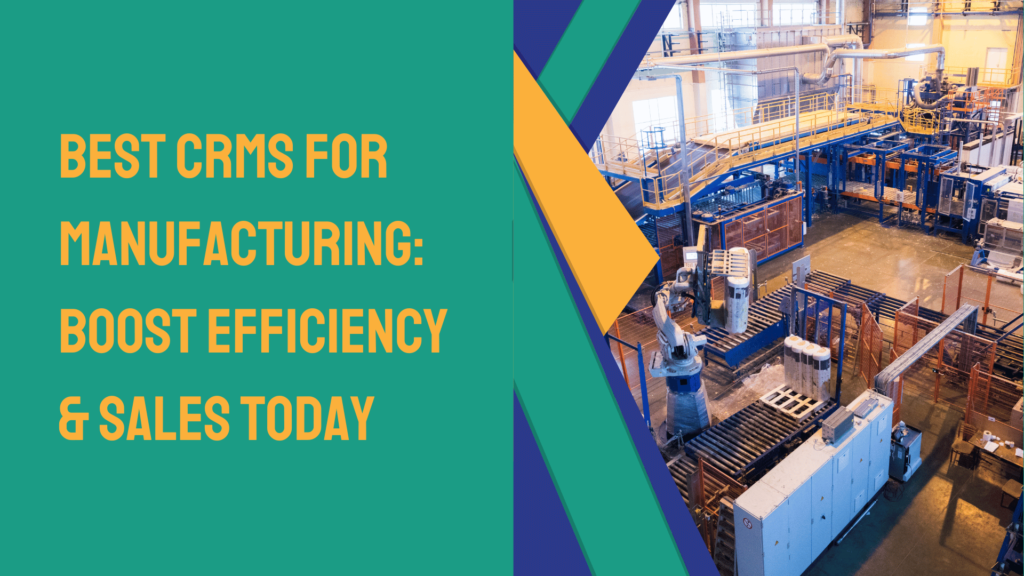Did you know that businesses using a CRM system experience a 29% increase in sales?
In today’s competitive landscape, leveraging technology to foster customer relationships is not just an option; it’s a necessity. As a seasoned CRM expert, I have seen firsthand how the right Customer Relationship Management (CRM) system can transform a manufacturing business, enhancing efficiency, boosting sales, and improving customer satisfaction.
The purpose of this article is to compare the top CRM solutions specifically tailored for manufacturing businesses, shedding light on their features, pricing, and ideal use cases. Choosing the best CRM is pivotal for success; it can significantly enhance customer retention, streamline operations, and foster business growth.
In this comprehensive guide, we will explore what to look for in a CRM for your manufacturing business, review the best options available, provide actionable steps for choosing the right system, and address common questions about CRM systems.
What to Look for in a CRM for Your Business
Scalability
When selecting a CRM for your manufacturing business, scalability should be at the forefront of your decision-making process. A good CRM system should not only meet your current needs but also adapt to your growing business. This means the ability to handle increased data, support more users, and integrate additional features as your operations expand.
Ease of Use
A user-friendly interface is essential for ensuring that your team can quickly adopt the new system without extensive training. Especially in a manufacturing environment, where time is of the essence, an intuitive CRM will facilitate smoother transitions and encourage higher adoption rates among employees.
Customization
Manufacturing businesses often have unique workflows and processes. Thus, choosing a CRM that allows for customization is crucial. This flexibility enables you to tailor the system to meet specific business requirements, improving efficiency and productivity.
6 Best CRM Solutions for Manufacturing Business
1. Pipedrive CRM
Pipedrive is a sales-focused CRM designed for simplicity and efficiency. It helps teams manage sales pipelines and automate tasks, offering robust tools for tracking deals, communications, and leads. It’s particularly helpful for businesses that want to streamline their sales processes without complicated setups.
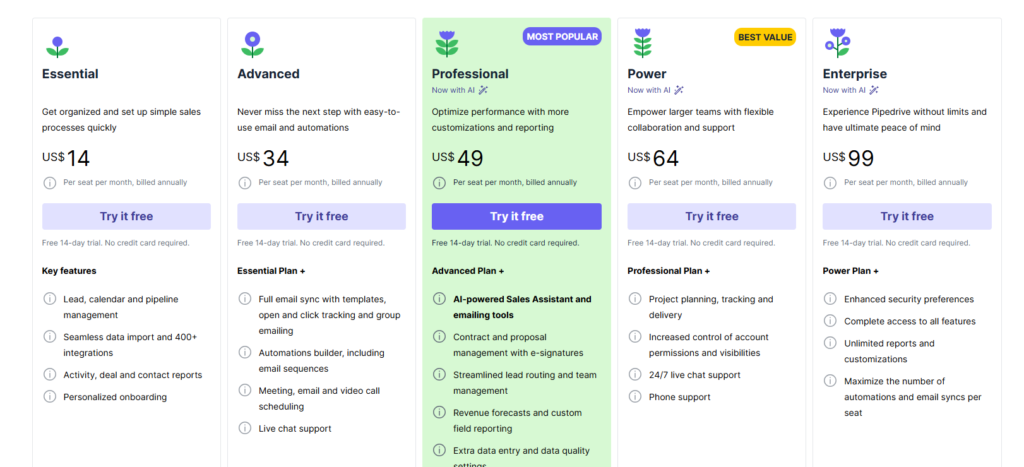
Key Features:
- Visual Sales Pipeline: Pipedrive’s drag-and-drop pipeline makes it easy for manufacturers to track leads, customer orders, and sales stages visually.
- Deal & Activity Management: Helps manufacturing teams stay on top of deals, supplier negotiations, and follow-ups by organizing tasks and timelines.
- Automation & Workflow Builder: Automates repetitive tasks such as follow-ups, helping manufacturing businesses save time on order tracking and client communication.
- Email Integration & Tracking: Ensures manufacturers stay connected with vendors and clients by tracking email conversations and responses.
- Reporting & Analytics: Offers detailed insights into sales performance, lead sources, and pipeline bottlenecks, helping manufacturers optimize their sales processes.
Pricing:
- Essential Plan: $14/month per user (basic sales pipeline management).
- Advanced Plan: $34/month per user (automation and email integration).
- Professional Plan: $49/month per user (advanced reporting and forecasting).
- Power Plan: $64/month per user (customization and enhanced features).
- Enterprise Plan: $99/month per user (full customization and support).
Manufacturing businesses looking for a straightforward, visual CRM to manage sales pipelines, especially those with smaller sales teams or shorter sales cycles. Pipedrive is ideal for companies focused on optimizing their sales processes without needing heavy marketing automation or advanced customization.
2. Salesforce CRM
Salesforce is a leading cloud-based CRM known for its extensive customization and scalability. It offers a wide range of tools to manage customer relationships, sales pipelines, marketing, and service operations, making it highly versatile for various industries, including manufacturing.
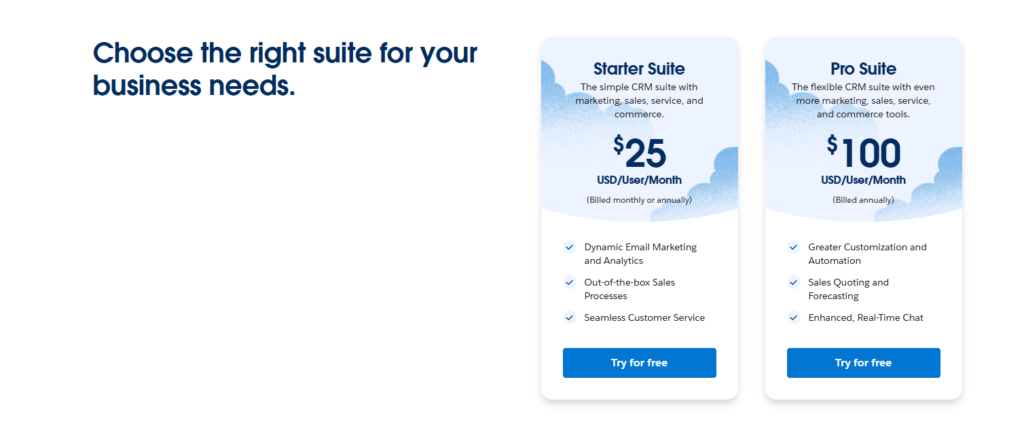
Key Features:
- Customizable Dashboards & Reports: Allows manufacturers to track sales performance and production metrics in real time.
- Sales & Service Cloud: Comprehensive solutions for managing customer service, B2B sales, and communication across teams.
- Process Automation: Automates repetitive tasks, enabling seamless workflows, approvals, and manufacturing processes.
- Inventory Management Integration: Integrates with third-party tools for managing inventory and logistics, crucial for manufacturing.
- AI-Powered Analytics: Salesforce Einstein delivers insights to predict trends, demand, and optimize production schedules.
Manufacturers with diverse product lines and complex supply chains, especially those looking for a highly customizable and scalable CRM. Ideal for large and medium-sized manufacturing businesses focusing on automation and advanced analytics.
3. HubSpot CRM
HubSpot CRM is a user-friendly, all-in-one platform designed to help businesses manage customer relationships, sales, and marketing. It’s known for its intuitive interface and strong integration with marketing tools, making it a great choice for manufacturers looking to enhance both customer management and lead generation.
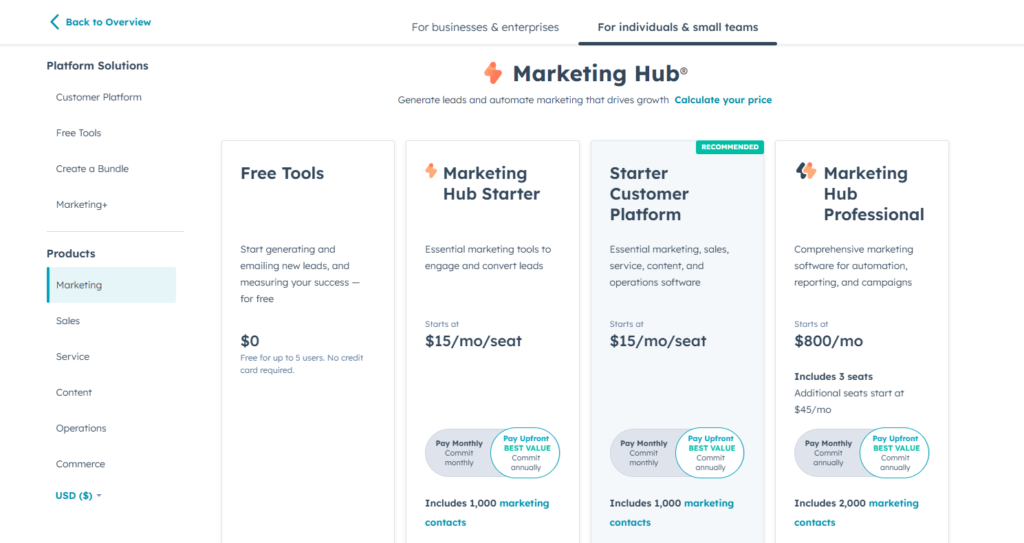
Key Features:
- Contact & Deal Management: Easy tracking of customer interactions and sales pipelines, useful for manufacturers managing long sales cycles and vendor relationships.
- Email Tracking & Templates: Allows manufacturers to keep track of important communication with suppliers or customers and automate follow-ups.
- Marketing Automation: Streamlines marketing efforts, helping manufacturers automate lead nurturing, email marketing, and customer engagement.
- Customizable Dashboards: Provides insight into sales performance, production forecasts, and customer service metrics.
- Integration with ERP & Inventory Tools: Seamless integration with other manufacturing-specific software like ERP systems to manage production and supply chains.
Pricing:
- Free Plan: $0 for core features.
- Starter: $15/month (basic CRM tools for small teams).
- Professional: $800/month (advanced automation and reporting).
- Enterprise: $3,600/month (deep customization and advanced features).
Small to mid-sized manufacturing businesses looking for an easy-to-use, scalable CRM with strong marketing capabilities. It’s ideal for manufacturers with a focus on customer acquisition and nurturing, especially those seeking cost-effective automation solutions in the early stages of business growth.
4. Microsoft Dynamics 365 CRM
Microsoft Dynamics 365 is a highly customizable CRM and ERP platform that integrates sales, customer service, finance, and operations. It’s tailored to meet the complex needs of large enterprises, particularly those in industries like manufacturing, where efficiency and process automation are critical.
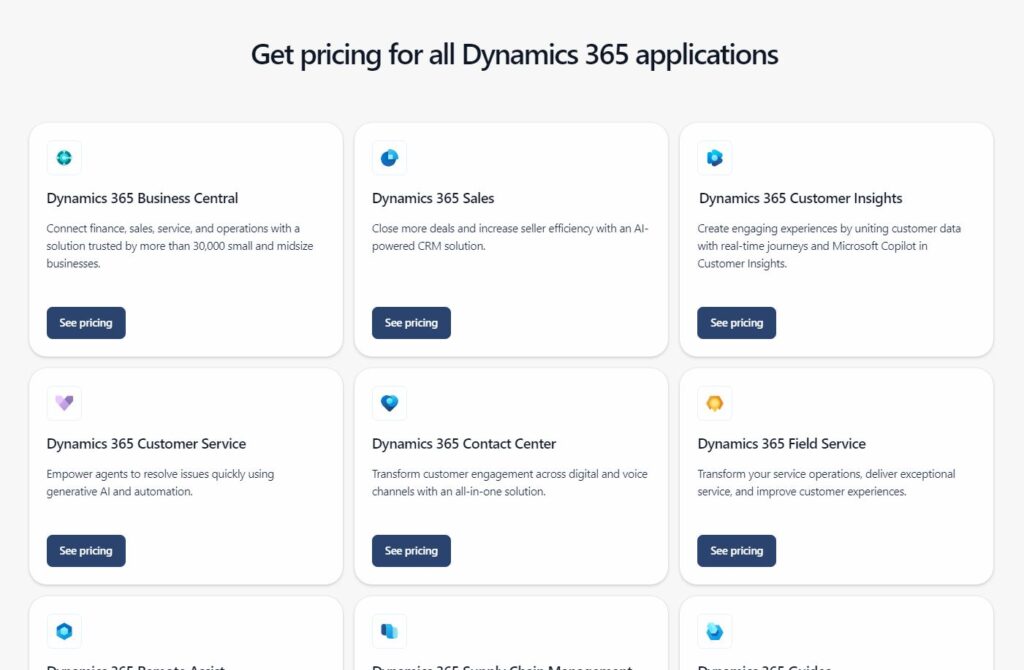
Key Features:
- Sales & Customer Insights: Provides manufacturers with real-time insights into customer behavior, sales forecasts, and pipeline tracking, which helps optimize production and sales strategies.
- Supply Chain & Inventory Management: Seamless integration with ERP systems allows manufacturers to manage inventory, suppliers, and production schedules effectively.
- AI-Driven Analytics: Predicts customer demand, analyzes sales trends, and helps improve production efficiency through AI-powered tools.
- Process Automation & Workflow Management: Automates routine tasks like order processing, lead nurturing, and vendor communication, improving operational efficiency.
- Integration with Microsoft Suite: Full integration with Microsoft tools like Outlook, Excel, and Teams, allowing manufacturers to streamline communication and collaboration across departments.
Large manufacturing businesses or enterprises with complex operations, supply chains, and a need for integrated ERP and CRM systems. Microsoft Dynamics 365 is ideal for manufacturers that require deep customization, AI-driven analytics, and advanced automation to manage large-scale production and sales processes.
5. Zoho CRM
Zoho CRM is a cloud-based CRM known for its affordability and extensive customization options. It offers a wide range of features to streamline sales, marketing, and customer support, making it a great solution for small to mid-sized manufacturing businesses that need a flexible and cost-effective CRM.
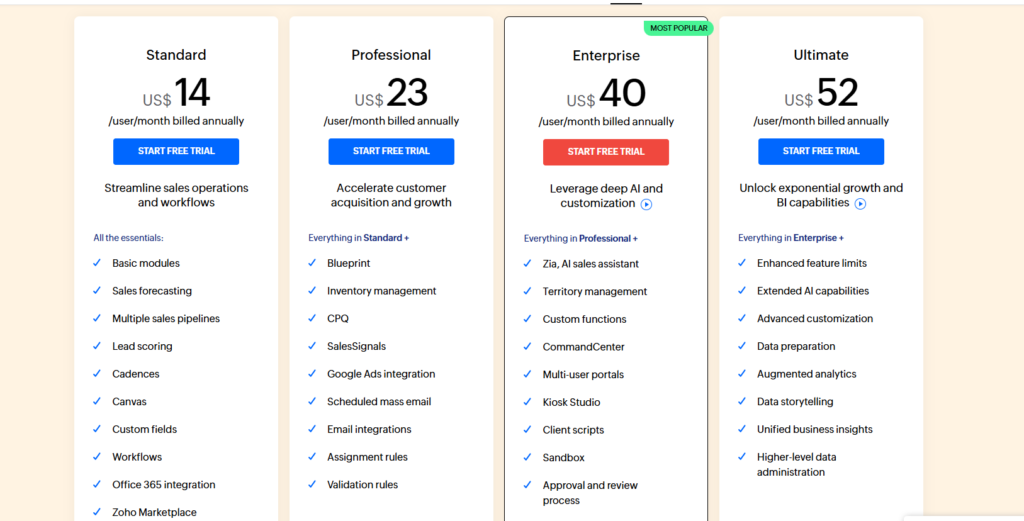
Key Features:
- Sales Pipeline Management: Helps manufacturers track leads, deals, and customer orders with customizable stages, making sales processes more organized.
- Inventory Management: Zoho integrates with inventory tools to help manufacturers manage stock levels, orders, and supply chain needs.
- Workflow Automation: Automates repetitive tasks like sending follow-up emails, scheduling sales calls, and managing customer inquiries, improving productivity.
- Advanced Analytics: Provides detailed reports and analytics on sales performance, customer trends, and forecasting, helping manufacturers make data-driven decisions.
- AI-Powered Insights (Zia): Zia, Zoho’s AI assistant, predicts sales trends and provides insights into customer behavior, helping manufacturers optimize production and sales strategies.
Pricing:
- Free Plan: Up to 3 users with basic CRM functions.
- Standard: $14 per user/month (basic CRM features).
- Professional: $23 per user/month (advanced reporting, inventory management).
- Enterprise: $40 per user/month (AI, advanced customization).
- Ultimate: $52 per user/month (premium features and customization).
Small to mid-sized manufacturing businesses that require a cost-effective, scalable CRM with flexible customization options. Zoho is ideal for manufacturers looking for basic inventory management and workflow automation to streamline their sales processes at an affordable price.
6. Keap CRM
Keap is an all-in-one CRM focused on automating sales and marketing for small businesses. It’s designed to simplify customer relationship management, lead nurturing, and marketing automation, making it a great tool for manufacturers that need to automate repetitive tasks and streamline their operations.
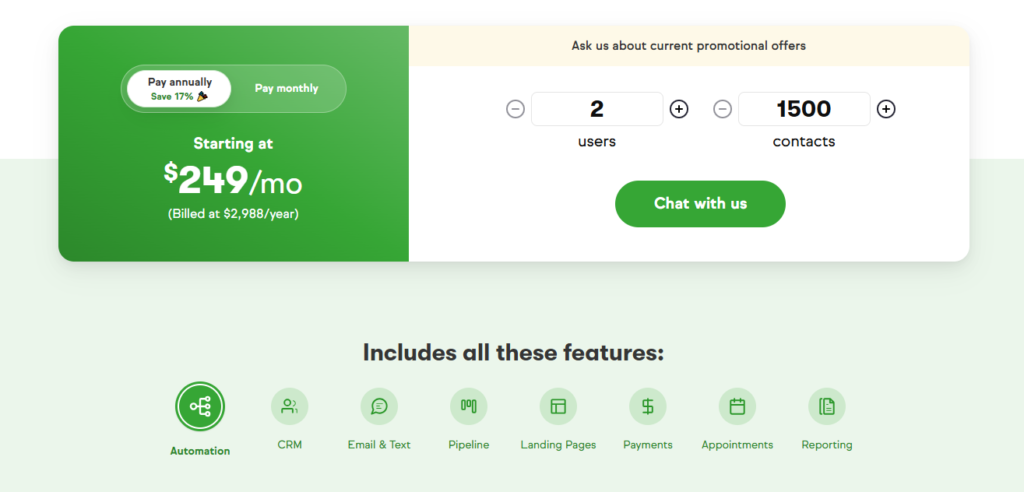
Key Features:
- Automated Lead Capture & Follow-ups: Helps manufacturers automatically capture leads from web forms, emails, and social media, then follow up through email sequences, reducing manual effort.
- Sales Pipeline & CRM: Tracks sales opportunities, customer orders, and project workflows, enabling manufacturers to manage sales cycles efficiently.
- Email Marketing & Automation: Manufacturers can automate email campaigns for product updates, order confirmations, and client follow-ups, improving customer engagement.
- Invoicing & Payment Processing: Integrates payment tools, allowing manufacturers to send invoices and receive payments directly through the CRM.
- Customizable Dashboard: Gives manufacturers insights into sales performance, leads, and marketing efforts to make better business decisions.
Pricing:
- Keap Pro: $249/month for 1,500 contacts and 2 users (includes CRM, automation, and invoicing features).
- Custom pricing available for more contacts or users.
Small to mid-sized manufacturing businesses looking to automate sales and marketing processes. Keap is ideal for manufacturers with limited resources who need to streamline customer interactions, lead management, and invoicing with a user-friendly, automation-driven CRM.
Which CRM is Best for Your Manufacturing Business?
Based on the critical factors discussed earlier, Salesforce stands out as the best CRM for manufacturing businesses. Its robust features, scalability, and customization options make it an ideal choice for companies looking to enhance their customer relationships while also optimizing their operations.
Use Case Recommendations
- Salesforce: Best for large enterprises needing extensive customization and integration capabilities.
- HubSpot CRM: Ideal for small to medium-sized businesses looking for an easy-to-use platform with free features.
- Microsoft Dynamics 365: Suited for businesses already using Microsoft products, offering seamless integration and advanced analytics.
- Zoho CRM: A cost-effective solution for startups and small businesses that require essential features and scalability.
- Pipedrive: Best for sales-driven teams focused on managing and automating the sales pipeline.
Now that you have an understanding of the best CRM options for manufacturing businesses, it’s time to take actionable steps. Consider starting a free trial or scheduling a demo with one of the recommended CRM providers to see how their features align with your business needs.
How to Choose a CRM: A Beginner’s Buying Guide for Manufacturing Business
Step-by-Step Guidance
- Identify Business Needs: Assess your current processes and determine what challenges you need the CRM to address.
- Evaluate Features: Look for key features that are critical for your operations, such as inventory management, sales forecasting, and customer support.
- Consider Budget Constraints: Understand the total cost of ownership, including implementation, training, and subscription fees.
- Assess Customer Support: Ensure the CRM provider offers adequate customer support, including training resources, live chat, and phone support.
Conclusion
In summary, selecting the right CRM for your manufacturing business is crucial for driving efficiency and enhancing customer relationships. As discussed, key factors such as scalability, ease of use, and customization should guide your decision-making process.
Always consider your long-term business goals when choosing a CRM. Investing in a scalable solution will pay dividends as your business grows and evolves.
Ready to explore your options? Check out the affiliate links to the CRMs mentioned above and start comparing features to find the best fit for your manufacturing business.
FAQs
Do I really need a CRM?
Yes, a CRM system can help you manage customer relationships more effectively, leading to increased sales and improved customer retention.
How secure is my data in a CRM?
Most reputable CRM providers offer robust security features, including data encryption and compliance with industry standards.
Can a CRM integrate with my existing tools?
Many CRM systems offer integrations with popular tools, ensuring seamless workflows and data sharing across platforms.
What is the cost of implementing a CRM system?
Costs can vary widely based on the provider and features you choose. Be sure to evaluate the total cost of ownership, including implementation and training.
How long does it take to set up a CRM?
Setup time can vary from a few days to several weeks, depending on the complexity of the system and your business’s specific needs.
By carefully considering your options and utilizing this guide, you can make an informed decision and find the best CRM for your manufacturing business, ultimately enhancing your operations and customer relationships.
A seasoned professional specializing in CRM, SEO, and Social Media Marketing (SMM). With a deep understanding of customer relationship management, I help businesses optimize their digital strategies to enhance customer engagement and drive growth. Passionate about delivering measurable results through data-driven techniques and effective marketing solutions.
Let me know if you’d like any adjustments!

